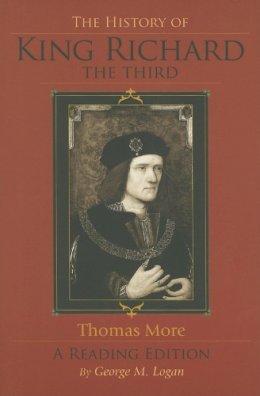George M. Logan is the James Cappon Professor of English and former Head of the Department of English at Queen's University, Canada. A leading More scholar, he is author of The Meaning of More's "Utopia", principal editor of the current standard Latin-English edition of Utopia, and senior editor of the 16th-century section of The Norton Anthology of English Literature.
"A terrific edition, ideal for purpose, putting More's Richard III back into circulation at low cost with exactly the right amount of guidance for students."—John Guy, Clare College, University of Cambridge "Logan . . . provides a clear edition of the English version of More's classic work, as well as lucid commentary on the value of the history, an annotated bibliography for further reading, a chronology of events, and a glossary for ease of comprehending 16th-century vocabulary. . . .This edition retains the flavor of the original language, employing footnotes to provide immediate illumination of difficult phraseology. . . . Recommended. Choice"—Choice "More's unfinished history of King Richard III holds an important place in English literature, influencing chronicle histories of its time as well as the character of Shakespeare's play. No serious historian of 15th—century English history even today dares ignore the role More's history played in shaping opinion of the king and his times. Logan (English, Queen's College, Cambridge Univ.) provides a clear edition of the English version of More's classic work, as well as lucid commentary on the value of the history, an annotated bibliography for further reading, a chronology of events, and a glossary for ease of comprehending 16th—century vocabulary. The author begins with a brief biography of More that addresses his classical literary interests, the satiric and dramatic structure of the work, and the reasons why More left it unfinished. This edition retains the flavor of the original language, employing footnotes to provide immediate illumination of difficult phraseology. An appendix tracks the influence of classical writers such as Sallust and Tacitus on More, and maps the appearance of More's material in later chronicles and Shakespeare's play. Summing Up: Recommended. General readers, upper—division undergraduates, and above. —Choice, Nov. 2006"—L. C. Attreed, College of the Holy Cross "More's History is of great importance for the development of prose narrative in Tudor England, and equally for its stimulus to the drama. Apart from the heavy volumes of the Yale edition there has been no version that combines the latest scholarship with a handy and attractive format. The Indiana Reading Edition not only fills a painful gap but does so with distinction. George Logan has provided just the sort of masterly edition that one might expect from his earlier work on Utopia, and it is presented in a format that is both appealing and comprehensive. The History can prove a highly attractive text for students once they have some initiation into the language and the assumptions behind the work; all this is now provided in a volume that is elegantly designed and easy to handle."—Dominic Baker Smith, Professor of English (Emeritus), University of Amsterdam

